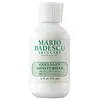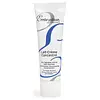What's inside
What's inside
 Key Ingredients
Key Ingredients

No key ingredients
 Benefits
Benefits

 Concerns
Concerns

 Ingredients Side-by-side
Ingredients Side-by-side

Butyl Methoxydibenzoylmethane 2%
UV AbsorberEthylhexyl Methoxycinnamate 7.5%
UV AbsorberBenzophenone-3 5%
UV AbsorberWater
Skin ConditioningHydrogenated Polyisobutene
EmollientGossypium Herbaceum Seed Oil
Skin ConditioningEthylhexyl Methoxycrylene
Skin ConditioningStearic Acid
CleansingCetyl Alcohol
EmollientSoluble Collagen
HumectantGlyceryl Stearate
EmollientPEG-100 Stearate
Acrylates/C10-30 Alkyl Acrylate Crosspolymer
Emulsion StabilisingSodium Hydroxide
BufferingLeuconostoc/Radish Root Ferment Filtrate
AntimicrobialPhenoxyethanol
PreservativeCaprylyl Glycol
EmollientHexylene Glycol
EmulsifyingButyl Methoxydibenzoylmethane 2%, Ethylhexyl Methoxycinnamate 7.5%, Benzophenone-3 5%, Water, Hydrogenated Polyisobutene, Gossypium Herbaceum Seed Oil, Ethylhexyl Methoxycrylene, Stearic Acid, Cetyl Alcohol, Soluble Collagen, Glyceryl Stearate, PEG-100 Stearate, Acrylates/C10-30 Alkyl Acrylate Crosspolymer, Sodium Hydroxide, Leuconostoc/Radish Root Ferment Filtrate, Phenoxyethanol, Caprylyl Glycol, Hexylene Glycol
Water
Skin ConditioningParaffinum Liquidum
EmollientStearic Acid
CleansingGlyceryl Stearate
EmollientTriethanolamine
BufferingCera Alba
EmollientCetyl Palmitate
EmollientButyrospermum Parkii Butter
Skin ConditioningSteareth-10
EmulsifyingPolyacrylamide
C13-14 Isoparaffin
EmollientLaureth-7
EmulsifyingPropylene Glycol
HumectantHydrolyzed Soy Protein
HumectantAloe Barbadensis Sprout
Humectant1,2-Hexanediol
Skin ConditioningCaprylyl Glycol
EmollientTropolone
Skin ConditioningParfum
MaskingWater, Paraffinum Liquidum, Stearic Acid, Glyceryl Stearate, Triethanolamine, Cera Alba, Cetyl Palmitate, Butyrospermum Parkii Butter, Steareth-10, Polyacrylamide, C13-14 Isoparaffin, Laureth-7, Propylene Glycol, Hydrolyzed Soy Protein, Aloe Barbadensis Sprout, 1,2-Hexanediol, Caprylyl Glycol, Tropolone, Parfum
 Reviews
Reviews

Ingredients Explained
These ingredients are found in both products.
Ingredients higher up in an ingredient list are typically present in a larger amount.
Caprylyl Glycol is a humectant and emollient, meaning it attracts and preserves moisture.
It is a common ingredient in many products, especially those designed to hydrate skin. The primary benefits are retaining moisture, skin softening, and promoting a healthy skin barrier.
Though Caprylyl Glycol is an alcohol derived from fatty acids, it is not the kind that can dry out skin.
This ingredient is also used as a preservative to extend the life of products. It has slight antimicrobial properties.
Learn more about Caprylyl GlycolGlyceryl Stearate is a mix of glycerin and stearic acid.
It is used to stabilize the mixing of water and oil ingredients. By preventing these ingredients from separating, it can help elongate shelf life. It can also help thicken the product's texture.
As an emollient, it helps soften skin and supports barrier-replenishing ingredients.
In cosmetics, Glyceryl Stearate is often made from vegetable oils or synthetically produced.
This ingredient may not be fungal-acne safe
Fun fact: The human body also creates Glyceryl Stearate naturally.
Learn more about Glyceryl StearateStearic Acid is a fatty acid. It is an emollient, emulsifier, and texture enhancer.
As an emollient, stearic acid helps soften skin. It aids the skin's protective barrier by preventing water loss. It also provides a gentle cleansing effect without stripping away natural oils.
Stearic acid may also be used to enhance the texture of products. It can add volume and stabilize ingredients such as water and oil. This can help water and oil ingredients from separating.
Sources of stearic acid include animal or vegetable fats/oils such as coconut or shea. It can be naturally found in butter, cocoa butter, shea butter, vegetable fats, and animal tallow.
This ingredient may not be Malassezia folliculitis, or fungal-acne safe.
Learn more about Stearic AcidWater. It's the most common cosmetic ingredient of all. You'll usually see it at the top of ingredient lists, meaning that it makes up the largest part of the product.
So why is it so popular? Water most often acts as a solvent - this means that it helps dissolve other ingredients into the formulation.
You'll also recognize water as that liquid we all need to stay alive. If you see this, drink a glass of water. Stay hydrated!
Learn more about Water